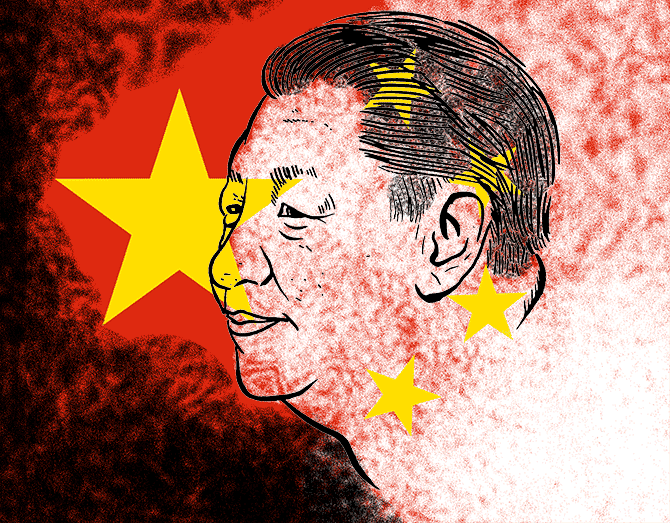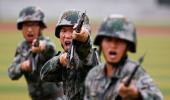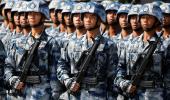On Sunday, March 11, the National People's Congress, China's parliament, will vote to keep Xi Jinping in power for as long as he wants.
'The American fear of the Chinese military is overblown. The countries that should be concerned are China's neighbours,' Jeffrey Wasserstrom tells Rahul Jacob.
Illustration: Dominic Xavier/Rediff.com

Ahead of China's widely scrutinised reshuffle of its senior leadership, Jeffrey Wasserstrom was asked by CNN to name the five most powerful people in China.
Such lists, much beloved of Time and Forbes, seem nowhere more silly than in China, akin to judging a foreign language film blindfolded.
Indeed, over the past few years, the inner workings of the Communist party have become even more impenetrable as President Xi Jinping has pursued an often anarchic anti-corruption campaign.
With his characteristic directness, Wasserstrom, a professor of history at the University of California, Irvine and the author of eminently readable books on modern China, declined to play along, telling CNN that the five people to watch were 'Xi, Xi, Xi, Xi and Xi.'
Even though the comment was made a fortnight before the new standing committee of the politburo was revealed, Wasserstrom's proved to be the most prescient summation of the 19th party congress well before Xi, 64, made an epic three-and-a-half hour speech and strode the stage on October 24 with the six other members of the standing committee, none of whom seem destined to succeed him.
The elevation of 'Xi Jinping thought' to a place in the Chinese constitution codified his position as the most powerful Chinese leader since Mao.
The subject of Wasserstrom's lunch-time talk -- increased censorship in China -- at the Foreign Correspondents Club in Hong Kong was likely set months in advance. The ensuing discussion seemed less substantial and topical than a talk by a leading Sinologist ought to have been in early November.
Wasserstrom's gifts as a historian with a keen antenna for everyday life still provided revealing insights. He recalled how when he "introduced two people in Beijing in the 1990s, they immediately told a joke about Li Peng (the unpopular premier of China through much of the nineties)" that involved an IQ measuring machine and the size of Li's head. Few would have the courage to do so openly today.
He explained how China has three geographies of censorship.
Hong Kong, because of an international covenant that governed its return to China in 1997, is the freest.
Political controls in Xinjiang and Tibet are the most severe; owning a book by or about the Dalai Lama in Tibet is likely to get one punished.
In the rest of China, the State, with enthusiastic help from technology giants Tencent and Alibaba, is exerting extraordinary electronic surveillance.
By 2020, the party will create a social score of each citizen's online behaviour that may be used to deny outbound visas or promotions, according to a recent article in Wired magazine.
All this underlines the irony that little more than a decade ago people predicted that "the Internet would transform China. We should keep in mind the unpredictability of the world", observes Wasserstrom.
Wasserstrom and I ate our lunch -- rubbery chicken in teriyaki sauce for me, sea bass for him -- about ten feet away from each other. He was sitting on a stage at a table for club committee members.
After lunch was over, I arranged to meet Wasserstrom for tea at the Fringe Club next door. We made our way down a narrow iron staircase to a café in a vault that a hundred years ago was used to store ice.
I first asked him about what seemed a conscious effort at the party congress not to signal the anointing of a successor to President Xi, who will complete a second term in 2022.
Wasserstrom replied that the convention of a successor being telegraphed well in advance is relatively recent.
Deng Xiaoping, the father of China's economic reforms, dispensed with two potential successors deemed too liberal before settling on Jiang Zemin, who served as party general secretary for more than a decade and was followed by Hu Jintao for 10 years.
What has made Xi's reign different is a relentless mowing down not only of opponents, but also of those seen as potential successors.
Sun Zhengcai, hitherto the youngest pPolitburo member at 54, was stripped of all his titles just a month before the party congress. (Investigators accused Sun of corruption, but also of being 'lazy and inactive and severely bureaucratic,' a startling indictment for anyone accustomed to Lutyens' Delhi's inertia.)
"Basically, we don't know (what comes next). Xi is a black box," he says, but as the conversation turns to the arrest of prominent human rights lawyers in China and a throttling of the historically more liberal press in Guangdong, the province just across the border that I covered for three years until 2013, his tone turns sombre.
He is troubled by the erosion of political freedoms in Hong Kong, which under the terms of its return to China in 1997 enjoys a separate judiciary and government until 2047.
In a controversial case, the Hong Kong government, believed to have been prodded by Beijing, pushed for the retrial of the leader of the massive democracy Umbrella Movement protests in Hong Kong in 2014, who was sentenced to six months in jail, just months before he turned 21.
Hong Kong's highest court intervened in late October to grant him and the other leaders bail. Wasserstrom sees this latest twist as a positive reinforcement of Hong Kong's special freedoms.
"I can't think of any other Communist country where a court can operate (independently) in this way."
Unlike in the first decade after the handover, however, when China itself appeared to be becoming more liberal and Hong Kong was still crucial to China's development, he now sees the flow of controls and ideas moving the other way.
When Wasserstrom, 56, first travelled to Hong Kong as a Berkeley student in 1987, it seemed "a complete departure from China, like West Berlin. Now, the worry is Hong Kong could be like West Berlin if it had been absorbed by East Germany."
This generally optimistic and very readable historian memorably characterised Communist China as more resembling Aldous Huxley's Brave New World -- a mostly satisfied population distracted by entrepreneurial opportunities and the neon advertising docudrama of its futuristic cities -- rather than the Orwellian nightmare of 1984.
He recounts being in an Internet café in Beijing in 1999 on the anniversary of the anti-imperialist May 4 movement led by students in 1919. Wasserstrom noticed he was the only one checking the Internet for messages about the anniversary. The youngsters around him were playing video games.
Circa 2017, he is more gloomy.
"I don't see anything to point to that is hopeful at the moment," Wasserstrom says of Xi's crackdown on the limited political freedoms Chinese enjoyed and the tendency by the international community to give him a "free pass" on human rights issues.
He is distressed that there was "such limited criticism of the first Nobel Peace prize winner (Liu Xiaobo who died in July) dying in captivity since the Nazi era."
He also sees Xi as more militaristic than his predecessors. "The American fear of the Chinese military is overblown. The countries that should be concerned are China's neighbours."
I ask if that includes India, my tea-cup rattling a little with the standoff at Doklam a recent memory. But, he means China's neighbours in the South China Sea.
Wasserstrom is struck by the manner in which history is being used in contemporary China. As in India, hyper-nationalism now trumps economic ideology. (Wolf Warrior 2, a blindingly violent film about a covert Chinese rescue mission in Africa that defeats mercenaries led by an American, was a huge hit this summer.)
"The Communist party needs to have stories to tell: 'Under our watch China became more respected and its territories got larger'," Wasserstrom says.
"The party today talks about its guerrilla fighters against the Japanese, not about organising factory protests."
Wasserstrom's sunny Californian demeanour notwithstanding, the turn in our conversation made the café feel about as chilly as an ice vault as we depart.












 © 2025
© 2025